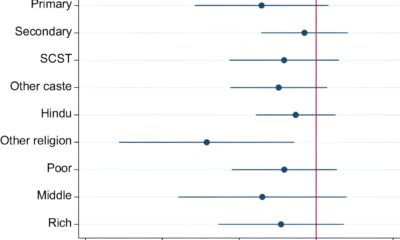Health
The COVID-19 pandemic is changing the perception that physicians are obligated to provide care: study

Credit: Pixabay/CC0 public domain
The unique circumstances arising from the COVID-19 pandemic changed a long-standing convention that physicians provide care regardless of personal risk.
In a study of physicians’ tolerance for denying care to COVID-19 patients, Duke Health researchers found growing acceptance of withholding care due to safety concerns.
“All papers throughout history have shown that physicians broadly believed that they should treat patients with infectious diseases,” said the study’s lead author, Braylee Grisel, a fourth-year student at Duke University School of Medicine.
“We thought our research would show the same thing, so we were really surprised when we found that COVID-19 was so different from all these other outbreaks,” Grisel said.
In a study published on April 24 in the news Clinical infectious diseasesthe researchers analyzed 187 published studies from thousands of sources, including academic articles, op-eds, policy statements, legal briefings and news stories. The studies selected for review met the criteria for addressing the ethical dilemma that has arisen in the management of a new infectious disease outbreak over the past forty years.
Most articles – about 75% – advocated the obligation to treat. But COVID-19 had the highest number of articles suggesting it was ethically acceptable to refuse care at 60%, while HIV had the fewest number of articles endorsing refusal of care at 13.3%.
The trendline remained relatively stable across outbreaks that occurred from the 1980s through the outbreak of the COVID-19 pandemic – with only 9% to 16% of articles stating that refusing care was acceptable.
What has changed with COVID? The authors found that labor rights and worker protections were the top reasons cited in 40% of articles during COVID, compared to only about 17% to 19% for other diseases. Labor rights were mentioned least often for HIV care at 6.2%.
Another major issue raised during the COVID pandemic was the risk of infection to doctors and their families, with almost 27% of articles discussing this risk, compared to 8.3% for influenza and 6.3% for SARS .
“Some of these results may be due to the fact that we had the unique opportunity to evaluate changing ethics while the pandemic was actively underway, as COVID-19 was the first modern outbreak to affect a significant number of frontline providers in the United States. putting states at personal risk due to its respiratory transmission,” said senior author Krista Haines, DO, assistant professor in the Departments of Surgery and Population Health Sciences at Duke University School of Medicine.
The authors noted that the COVID pandemic had several unique features that collectively changed the social contract between physicians and patients, potentially leading to changes in treatment expectations. Such factors include:
- Shortages in resources available to healthcare teams, including personal protective equipment, hospital rooms, ventilators, treatments and vaccines;
- Polarizing misinformation about vaccines, effective treatments and how the virus spreads;
- Increased numbers of reported assaults against staff by patients and their relatives.
The authors note the ongoing debate over whether vaccination status should be taken into account when deciding whether to treat a patient.
“There was considerable debate among frontline providers and ethicists about the best way to allocate scarce resources,” the authors wrote. “Patients who refused vaccination were at greater risk of complications, while also endangering other patients and healthcare providers. Arguments based on reciprocity, medical triage, and personal responsibility were made to exclude patients who refused vaccines from consideration when ventilators and other resources were limited. .”
Grisel said the study’s findings provide insight into how care should be delivered in future pandemics. The fairly solid expectation that physicians were obliged to provide care despite the risks to themselves now appears to have softened. It is unclear how these results might change in the future when the pandemic is less active.
“This study really shows how outside pressures in the sociopolitical sphere impact and influence physicians and health care providers,” Grisel said. “In future pandemics, we may need to become more aware of how the risks and external pressures of an active pandemic influence willingness to provide care. Healthcare systems can learn how to mitigate these influences to ensure hospitals have sufficient staff to meet patient needs. .”
More information:
Krista Haines et al, The Ethical Obligation to Treat Infectious Patients – A Systematic Review of Reasons, (2024). DOI: 10.1093/cid/ciae162
Quote: COVID-19 pandemic changes perception that doctors are obligated to provide care: study (2024, April 24) retrieved April 24, 2024 from https://medicalxpress.com/news/2024-04-covid-pandemic-view- doctors-obligated .html
This document is copyrighted. Except for fair dealing purposes for the purpose of private study or research, no part may be reproduced without written permission. The content is provided for informational purposes only.













